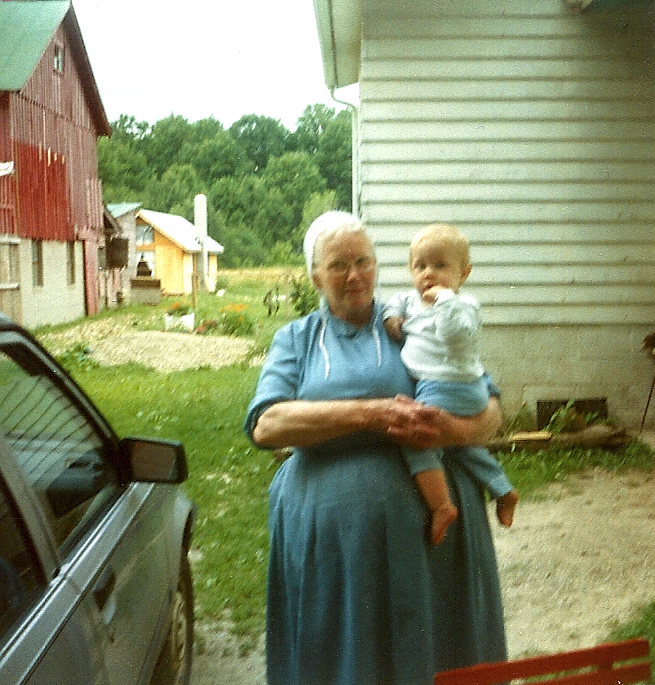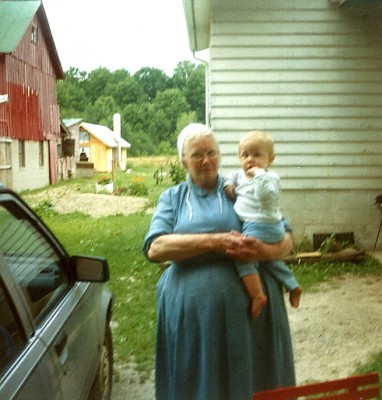Often when someone dies, we have a way of “purifying” our memories of that person. When my feelings of missing Mem were their keenest, I did dwell on my good memories of her, and not on the ones that complicated my view of her. However, now that several years have gone by since she died, I keep trying to understand her and I find that my feelings for Mem are as complex as she was. She had two contradicting sides to her — she could be soft, understanding, and nurturing or she could be harsh and cruel with her whip or leather belt; she could be brutally honest or she could be evasive of the truth; she could sometimes espouse to the Amish values and question them at other times; she could support me in my endeavors and my freedom from the Amish set of restrictions, while eliciting sympathy from the Amish that I had left; and she could play the martyr that she was in such an unhappy marriage, yet be the lonely widow once Datt died.
One of the things Mem was good at was to elicit feelings of sympathy, especially when she cried. I used to feel so guilty and horrible when I made her cry. When I left the Amish the first time, I could not think about how sad she must be, or else I would have gone back out of guilt. Just before Mem died, she was still saying, “You girls all rejected me.” I was talking to her on the phone during the hospital stay that would lead the doctors to conclude that there was nothing else they could do for her, and she was sent home. I tried to tell her that we sisters had all decided as adults to leave the community, but it had nothing to do with rejecting her. By the silence at the other end, I could tell Mem was not convinced. I changed the subject.
When Mem first found out that I was writing for publication, she wrote this to me in a letter: “Let me give you some advice: you should write only good things about the Amish, and then your books will sell better.” Mem was right — at least if I go by all the romantic versions of Amish life depicted in “bonnet fiction.” But that would not have been telling my truth. Recently I read something in Poets and Writers magazine that really resonated with me. Poet Nikky Finney describes how her grandmother made a stunning, fervent request after reading one of Finney’s books — she asked that it be her last. Finney wrote: “I would’ve promised to sail the seven seas in five days if I could have, for my grandmother. She meant that much to me. ‘Promise’ she said. But I couldn’t. Even for her, I couldn’t.”
Perhaps the time we feel the most vulnerable to our loved ones’ wishes is when we know that they are dying. And so it was for me when Mem, on a day that she had truly lost her dignity — she had no hair from chemotherapy, and even the scarf she tried to wear on her head for a covering kept slipping off; she couldn’t wear her teeth; and she was eating ham without a knife or fork — literally taking a big piece of ham between her fingers and thumb and gumming it. It was in this pathetic situation that she asked me “to not publish anything bad about Joe or me.” I couldn’t promise Mem any more than Finney could promise her grandmother.




I agree. You can forgive, but to forget would be to lose the gift of the spiritual lessons. You have to look long and hard to find them sometimes. For me, the more I don’t look away and examine objectively, the easier it is to forgive. We are all flawed children, after all. Sometimes the closer the relationship the more complicated the feelings, especially with parents who are inconsistent and sometimes cruel. Bless you! Bless that little girl! :):)
Well written, Saloma – and truly from the heart.They say we women become our mothers, and in some ways this is true. I do think that as we age, some of us become highly introspective and do look back and delve more deeply into our relationship with our parents and try to figure out “what makes them/us tick”. What I have learned in doing this is that, while we do inherit some of the same characteristics, and do in some ways become the same, there are vast differences also. We each are, after all, very unique individuals which is how God made us. We have much to learn from our past and it behooves us to contemplate and learn from it, but then to move forward from it. I totally agree with Rita – I have forgiven others from the past, but will never forget. The hardest for me – and for others, I suspect – is indeed to also forgive that little girl I once was. We are hardest on ourselves, it seems…
Again, THANK YOU for sharing.
A very touching life’s story. I think our relationships with our parents are at most times complicated, and sometimes we start to understand them only after they are gone from this world. We may never really fully understand each other even as we near the end of our own lives, but at least a daughters love for her mother is the one thing never in question or doubt. Richard from Lebanon county’s Amish settlement.
Wow, what a tough situation to be stretched in opposing directions…to potentially hurt your mother’s legacy versus speaking (or writing) the truth. Kudos to you for sticking with what you know to be right.
It is difficult to forget the trauma others inflict on us even though we forgive them. Such traumas, be they physical or emotional, leave scars. I’m so sorry and I have an idea of what you have had to go through although no one can know exactly how you feel.
I too struggle with the question of forgiveness. I do believe that there is something important to be taken away from most situations; though I admit there are things I wish I could forget. As I’m sure you know, some things seem to be easier to forgive than others. I’ve forgiven something only to have feelings/things come up concerning that situation again. I’ve come to the conclusion that forgiveness is often a process and not something that can completely be done all at one time. Certain things scar us deeper than others and only by living life do we not only heal, but we also find other things that remind us of that time. Then we have to work on it again. I struggle sometimes with feeling like I have to do this again, but do feel it’s necessary. It’s the only way for me to bring complete healing.
Boy, does this strike home. My mother was a real whiz-bang. She could be funny and clever – she loved puns – and then all of a sudden it was as if she realized grown-ups weren’t supposed to smile and “That’s enough of that”. It was almost as if she had a split personality.
Her expectations of my sister and me were completely unrealistic, and the way she talked about my father was disgraceful. She was a schoolteacher and he was an Epsicopal priest, and she felt she had lowered herself to marry him. And made no particular sercet of it.
She has Altzheimers now, and it is very difficult for me to visit and be kind to her. I try to get her to talk about the past and see if I can get a grip on what made her the way she was, but she is lost in her own world.
Saloma,
I was a bit critical and at times in the fog of my mother’s discipling and her ways of controlling her teenagers. I really had to look at her experiences; as she was a twelve year old World War II immigrant with no further contact with her immediate family. I watched the movie, “YaYa Sisterhood” I came to believe that she was doing the best she could to protect her family. I really see now that her sense of protection and discipline upon us was her insecutities she must have felt as a young person.
Blessings,
Debbie S.
This is the story of my Mother, except her last request to me was asking forgiveness for the way she treated me. I told her that I have already forgiven her and she said, “Maybe now I can die.”
I am more and more understanding what made her be the way she was. This goes for Dad too. Both of them were forgiven by God for they had made peace with Him.
I applaud your resolve to write and speak truth – rather than succumb to the popularity of bonnet fiction. The truth is better than fiction.